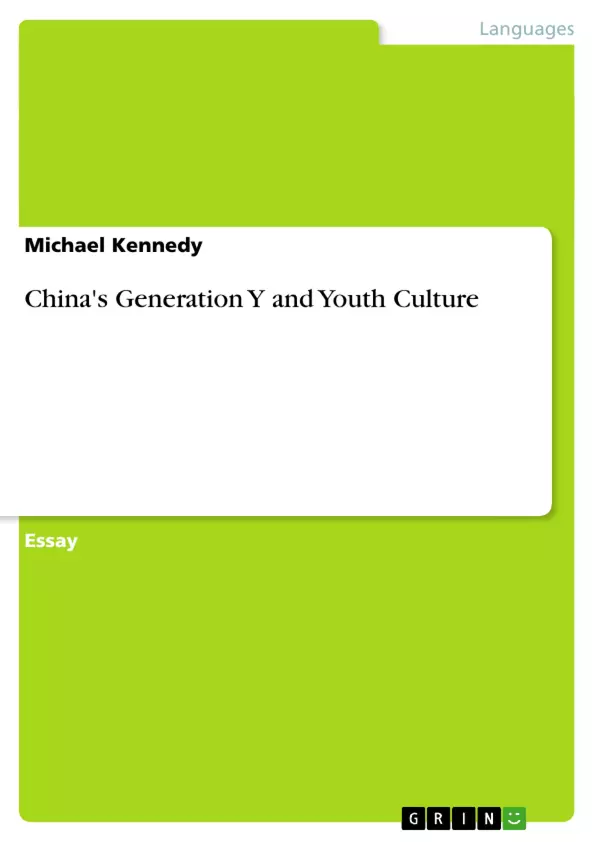The post-1980 generation of Chinese or China’s Generation Y can be characterized by a number of factors. One of the most significant factors that characterizes China’s post-1980 generation that differs from previous generations is the strong materialistic attitude that has become apparent. One such example, as outlined by Yan (2006, pg. 255) is the dramatic embrace of McDonald’s in China. This embrace of McDonald’s and the slogan “I’m lovin’ it” or “jiu xihuan” resonates this life aspiration to achieve “instant individual gratification in terms of a pleasurable and comfortable material life”. This attitude is in opposition to China’s former generations who embraced a more collective mindset and had less desire for material gain. In contrast, China’s new generation are more comparable to American youth as having an “individualistic” and fun-seeking behavior that goes beyond social norms. However, where this differs is where Chinese and American youth perform such acts. While Americans may be more outwardly public about their behavior, the Chinese appear to place more emphasis on personal consumption. Furthermore, as Yan (2006, pg. 256) describes, this new generation also have ambitions in the field of business to build wealth in order to acquire more material wealth. In contrast under Chairman Mao, former generations were more concerned with being provided for through the communist system. Part of this reason is because of China’s new economic policies where advancing financially is more possible than ever and this new generation is responsible for fulfilling the dreams of their parents and to provide for them as they grow old.
Inhaltsverzeichnis (Table of Contents)
- China's Generation Y and Youth Culture
- Materialistic Attitude and Individualism
- Westernization and "Little Emperors"
- Educational System and Stress
- McDonald's and Chinese Society
- Politics and Surveillance
Zielsetzung und Themenschwerpunkte (Objectives and Key Themes)
This essay explores the characteristics and cultural trends of China's Generation Y, focusing on how they differ from previous generations. The essay aims to provide insights into the unique blend of Westernization, materialism, and academic pressure that defines this generation.- Materialistic Values and Individualism
- Western Cultural Influences
- Educational System and its Impact
- Shifting Social Norms and Dating Practices
- The Role of Politics and Government Surveillance
Zusammenfassung der Kapitel (Chapter Summaries)
This essay examines the characteristics of China's Generation Y, highlighting their materialistic attitudes and individualistic tendencies compared to older generations. The essay delves into the influence of Western culture and its impact on their values and behaviors, specifically focusing on the "little emperor" phenomenon. The essay further analyzes the competitive educational system in China and its role in creating stress and negative psychological effects on youth. It also explores the paradoxical embrace of McDonald's in Chinese society and its implications for social norms, particularly dating practices. Finally, the essay briefly touches upon the political implications of Generation Y's individualistic mindset and the government's increasing surveillance measures.Schlüsselwörter (Keywords)
This essay focuses on China's Generation Y, examining their materialistic values, individualism, Westernization, educational pressure, social norms, and the role of politics and government surveillance.Frequently Asked Questions
What characterizes China's Generation Y (post-1980 generation)?
They are characterized by strong materialistic attitudes, individualism, and a shift away from the collective mindset of previous generations.
How does Western culture influence Chinese youth?
The embrace of brands like McDonald's and a desire for personal consumption show a significant Western influence on their lifestyle aspirations.
What is the "Little Emperor" phenomenon?
It refers to the only children resulting from the one-child policy, who often receive undivided attention and resources, leading to more individualistic behaviors.
What role does the educational system play in their lives?
The system is highly competitive, creating significant stress as this generation is often responsible for fulfilling their parents' dreams and providing for them.
How do dating practices differ from previous generations?
Shifting social norms, influenced by individualistic and fun-seeking behaviors, have led to more open and varied dating practices compared to the Mao era.
- Quote paper
- Michael Kennedy (Author), 2013, China's Generation Y and Youth Culture, Munich, GRIN Verlag, https://www.grin.com/document/268265



